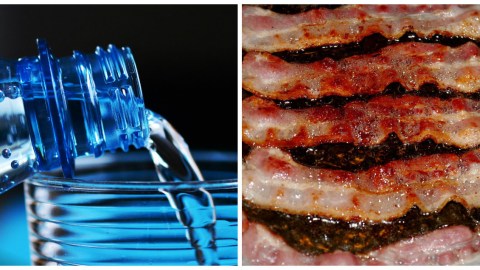Keto diet: 5 of the biggest food plan mistakes

Pixabay
- The high-fat, low-carb keto diet involves putting your body into a natural metabolic state called ketosis.
- When done responsibly, the keto diet can yield a wide range of benefits, most notably weight loss.
- Some people have less luck than others on the keto diet because they make a few common mistakes, including failing to drink enough water, eating too many unhealthy fats, and not realizing which foods might kick them out of ketosis.
The gist of the keto diet is simple: Eat less carbs and more fats. But actually sticking to a diet that avoids sugars, breads, potatoes, beer and most fruits isn’t easy. If you research the keto diet, you’ll find message boards littered with people who’ve tried and failed to live by the keto diet, or who’ve implemented it correctly, and you’ll also come across tons of keto diet progress blogs that mysteriously go dark after week two.
Simply put, it’s tough to keep your body in ketosis – especially in a society where most of the meals readily available at restaurants, fast food stops and grocery stores include large amounts of carbs.
“Even in the hospital under strict controls, when we send patients into ketosis for medical reasons, it can be extremely difficult to do,” Melissa Bailey, a clinical dietitian at the Hospital of the University of Pennsylvania, told Health. “On your own, it’s virtually impossible to do it consistently.”
It can also be difficult to implement the keto diet in a healthy way, as evidenced by the common side effects people often report. Still, it’s possible to stick to the keto diet – and reap some surprising benefits – if you can manage to avoid these common mistakes.
Eating too much protein
Protein is an essential macronutrient that helps us feel full, burn fat and build muscle, and it plays a key role in any healthy diet, including keto. However, you might’ve heard that overeating protein can actually be counterproductive to a keto diet because of a process called gluconeogenesis, in which your body turns non-carbs into glucose.
But the research on this claim has failed to back it up, and most anecdotal reports suggest that eating even moderately high amounts of meat won’t kick you out of ketosis. Still, eating tons of protein can slow down your weight loss, and, if you’re eating too many processed meats, it can increase your levels of “bad cholesterol” known as low-density lipoprotein.
To ensure you’re consuming a healthy amount of protein on the keto diet, you can generally stick to these guidelines:
- If you are sedentary — consume 0.6 – 0.8g of protein per pound of lean body mass.
- If you are regularly active — have 0.8 – 1.0g of protein per pound of lean body mass.
- If you lift weights — eat 1.0 – 1.2g of protein per pound of lean body mass.

Pixabay
Not drinking enough water
Many people lose weight soon after starting the keto diet, some more than 20 pounds in the first month. But important to keep in mind is that most of those dropped pounds come from water weight—after all, your body is more than half water.
“When carb intake is restricted for a few days, glycogen stores in the muscle are reduced,” Carol Johnston, professor and associate director of the nutrition program in the School of Nutrition and Health Promotion at Arizona State University, told ASU Now. “Glycogen is responsible for water retention, so when its levels fall, so do our water levels. To the average person, the diet appears to be working. The number on the scale is going down. But, since most of this weight lost is water weight, it will return when the person consumes carbs again.”
This intense water loss can lead to dehydration, and therefore constipation. What’s more, the loss of glycogen can also lead to a reduction of lean muscle. The good news is that you can offset this with strength training, which helps you gain glycogen and water over the short and long term.
In any case, remember to drink more water than usual if you’re planning to start the keto diet.
Consuming too many carbs
Avoiding carbs on the keto diet sounds like a no-brainer. After all, if you’re craving snacks you can just pick up some keto-friendly foods and drinks, like a sugar-free latte, cashews and black beans.
Actually, all of those – and other foods like processed vegetable oils, starchy vegetables and most beans and legumes – can kick you out of ketosis due to their high carb content.
“Overconsumption of carbs is definitely very easy,” Kristen Kizer, a dietitian at Houston Methodist Medical Center, told Health. “And if you’re eating carbs and not realizing it—unless you’re really monitoring your ketones regularly—you’re going to fall out of ketosis and not know it.”
If you’re looking for some foods and drinks that are typically keto-friendly, turn to fish, eggs, unsweetened tea, bone broth, above-ground vegetables and unprocessed meats.
Eating too many unhealthy fats
On the keto diet, you eat lots of fats because they’re the fuel your body runs on during ketosis. But eating a high-fat diet can get unhealthy fast if you aren’t careful because some fats are worse than others.
“I know people following keto, and a lot of times I’m seeing that there’s a lot of bacon in their day, or a lot of really processed meat,” Bailey told Health. “And those things are super-high in sodium and super-high in saturated fat, which can really affect your cardiovascular health.”
But are saturated fats really that bad for you? Although a 2017 survey of the research found “no clear message regarding health effects of saturated fats,” the American Heart Association recommends that you aim to get only 5 to 6 percent of your daily calories from saturated fat, which can come from red meat, eggs, coconut oil and butter.
“If people want to follow this diet, there’s a way to get that extra fat in your diet but still choose healthy fats,” Bailey said.
Thinking of the keto diet as a ‘quick fix’
Pounds tend to drop quickly on the keto diet. But, as mentioned above, the bulk of that weight—at least at first—comes from water, and even the lost fat that doesn’t come from water will be hard to keep off if you don’t have the discipline to stick to the diet.
Learning to keep your body in ketosis is a lifestyle change, not just a diet. It requires having the discipline to consistently reject some of the most tempting foods and drinks available — including alcohol. Given the challenges involved, and some of the more unpleasant effects you’ll likely undergo during the transition into ketosis, it’s probably worth considering whether the keto diet is something you really want to commit to before you start.





